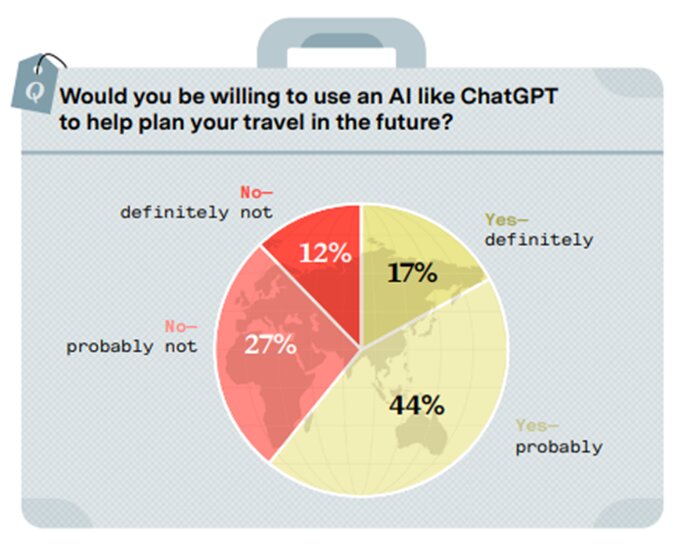Solving the trust paradox for travel AI


Synopsis
The rapid proliferation of conversational AI technology in the travel industry promises a streamlined travel-planning process for consumers. However, despite evident enthusiasm for this innovation, data reveals a paradox of trust: while consumers desire the convenience of AI planning their vacations, they hesitate to entrust it with sensitive personal information. Concerns extend beyond data protection to the accuracy of AI recommendations. As travel brands scramble to capitalize on this technology, they must prioritize "low stakes" use cases to foster trust gradually, ensure robust data safeguards, and avoid premature commercialization that could jeopardize user confidence. The journey toward mainstream AI acceptance in travel planning will require a keen understanding of the evolving cultural context around this technology and adaptability to changing consumer behavior.
As recently as a year ago, the idea that significant numbers of consumers would soon be asking AIs to plan their vacations for them would have seemed laughable; or, at the very least, a sci-fi dream many years, if not decades, ahead of its time.
How quickly things change. Since the public release of ChatGPT in late 2022, and the resultant boom in AI-powered applications, the travel industry has been playing catch-up—trying to develop tools and services to take advantage of the obvious consumer interest in the technology.
A National Research Group (NRG) study in April found that 61% of US travelers were interested in the idea of using conversational AI to help plan an upcoming trip. Since then, major industry players like Expedia and AirBnB have announced plans to add AI functionality to their apps and web services; hotel chains like Hilton have begun to roll out in-room AI assistants; and a slew of popular travel influencers have started extolling the virtues of AI-powered travel planning to their legions of loyal followers.

But amidst this breathless hype, it’s worth pausing to consider some of the potential pitfalls that lie ahead. Consumers’ experiences with conversational AI over the coming months will, inevitably, play a major role in shaping the way they feel about this technology—and in determining whether or not they’re willing to make it a core part of their travel-planning arsenal.
So, the onus is on travel brands and tech companies to get ahead of these potential pain points that may stand in the way of this technology successfully making the leap from early adopters to a mainstream audience.
The paradox of AI trust
A central part of the appeal of AI, from a consumer perspective, is the possibilities it offers for lessening the emotional and mental drain that so often comes along with organizing a trip. In theory, a virtual travel assistant could be used to book hotels, manage a budget, find deals on flights, make packing lists, and organize visas. It could, in other words, take on all the boring admin tasks that go into planning a vacation—freeing people up to devote their energy to more exciting activities like researching the local area or choosing which attractions they want to add to their itinerary.
And therein lies the rub. For an AI assistant to successfully complete these sorts of tasks, it would need access to a wide range of potentially sensitive customer information. But unfortunately, most consumers say they’re not yet comfortable with the idea of handing that kind of information over to an AI. Fewer than a quarter of travelers, for example, say that they’d be willing to let an AI have access to their visas, passports, or other travel documents. And even fewer say they’d consider sharing information about their children and their needs when traveling with an AI.
This, in essence, is the core paradox of AI for the travel industry. On the one hand, consumers say they’re excited about using the technology to take the hassle out of planning their vacations. But, at the same time, they’re unwilling to invest it with the level of trust that would be necessary to do that job in a meaningful way.
The problem becomes even more complex when we consider the fact that this question of data trust—“Can I trust that you’re going to adequately protect and not misuse my personal information?”—is only one half of the equation. There’s also the question of recommendation trust that needs to be considered: “Can I trust that the information the AI provides me with is both accurate and reflective of my specific wants, needs, and preferences?”
This latter problem may be an even thornier one to solve. A vacation often represents the culmination of months, if not years, of saving up and planning, so consumers inevitably feel a strong sense of pressure to make sure the quality of the trip justifies the time and money expended on it. In that context, a single mistake by an AI could have enormous emotional ramifications–and could turn people off from the technology for a lifetime.
Designing for the long-haul
So, what does this all mean for the travel brands currently racing to bring their AI-powered travel solutions to the market?
For one thing, they will need to make some canny decisions about which types of use cases to prioritize. Brands need to be prepared to take their customers on a long-term journey when it comes to building trust in this technology
— and that means encouraging them to play around with conversational AIs in “low stakes” situations first, before asking them to share sensitive personal data with those AIs or make major travel decisions based on their recommendations.
Moreover, brands will need to ensure that they have the necessary safeguards in place to reassure users that their data will be treated with the level of respect it deserves. In practice, that will mean resisting the temptation to move too quickly when it comes to commercializing this technology. If, for example, consumers start seeing targeted ads clearly based on information they’ve shared with an AI travel assistant, that could sour them on the technology before it has a chance to fully demonstrate its value-add.
The good news, however, is that none of these problems are insurmountable. In fact, early data suggests that the more time consumers spend playing around with platforms like ChatGPT, the more trust they’re willing to place in conversational AIs. So it’s possible that some of these challenges will naturally start to resolve themselves as this technology becomes more deeply integrated into other aspects of consumers’ daily lives.
Nonetheless, it’s crucial that travel brands investing in this space recognize the reality of the consumer landscape as it is today—and that they temper their expectations for what the average traveler is willing to use AI for. You can build the shiniest, most powerful AI tools imaginable; but that’s only half the battle. Finding an audience for them is going to require a deep understanding of the evolving cultural context around this nascent technology, and a finger on the pulse of changing behavioral norms.